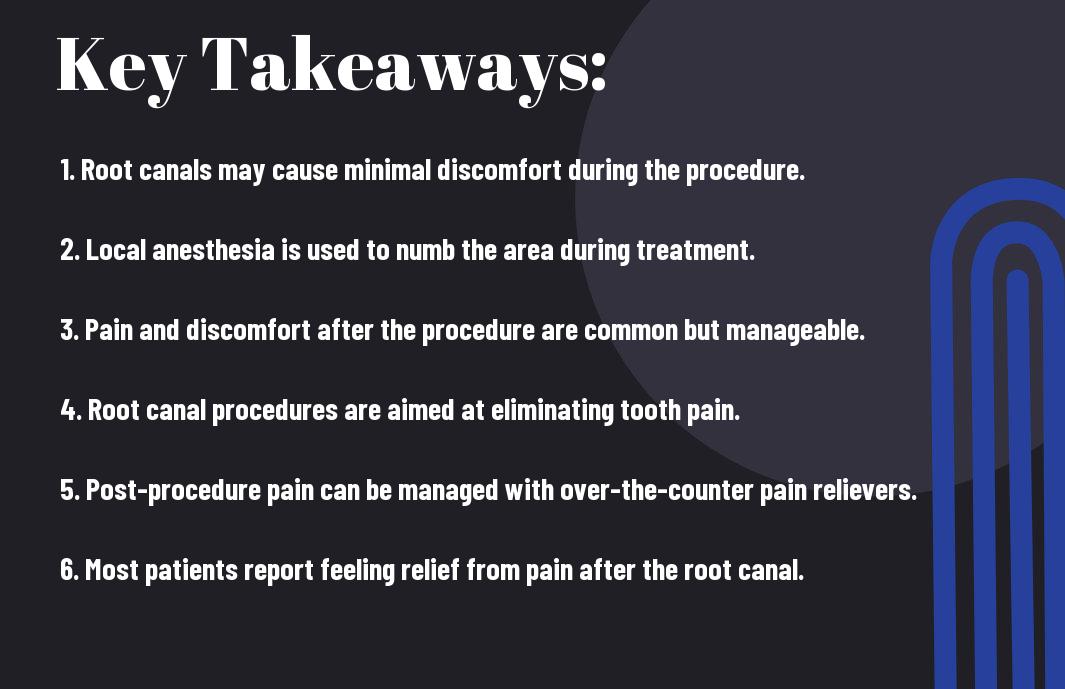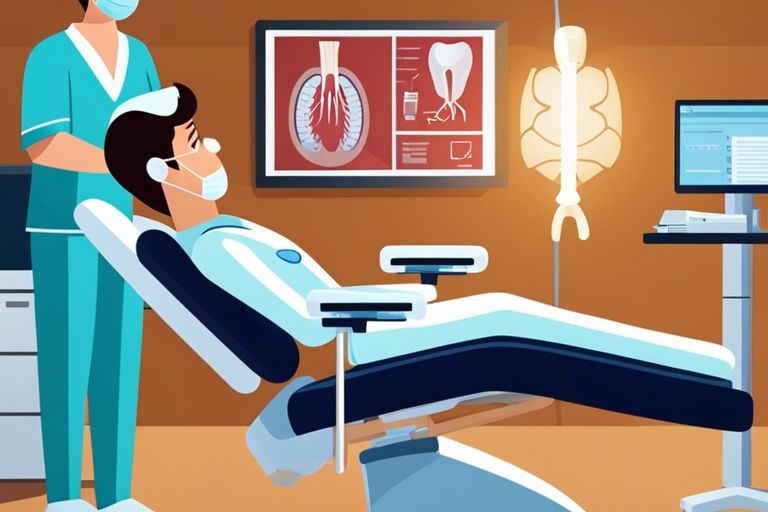Unquestionably, the idea of getting a root canal can be daunting, but the truth is that the procedure is not as painful as it is made out to be. In fact, the purpose of a root canal is to relieve the intense pain caused by an infected tooth. During the procedure, you will be given a local anesthetic to numb the area, so you should not feel any pain. However, it is normal to feel some discomfort and soreness in the days following the procedure. I will walk you through exactly what to expect during a root canal, from the initial consultation to the recovery process, so you can feel more prepared and at ease.
Key Takeaways:
- Root canals are not as painful as their reputation suggests. Thanks to modern anesthesia and techniques, the procedure is relatively painless.
- You may experience some discomfort during and after the procedure. While the root canal itself should not be painful, some patients may feel slight pressure or discomfort. It’s common to experience mild pain and sensitivity in the days following the procedure.
- Proper aftercare is crucial for minimizing discomfort. Following your dentist’s aftercare instructions, such as taking prescribed pain medication and avoiding hard or sticky foods, can help reduce post-procedure discomfort.
- Communicate openly with your dentist about any concerns. If you’re feeling anxious or experience unusual pain during the procedure, don’t hesitate to communicate with your dentist. They may be able to adjust anesthesia or provide additional support to help you feel more comfortable.
- Avoiding treatment due to fear of pain can lead to more severe dental problems. It’s important to address dental issues promptly, as delaying necessary treatment can result in more extensive and painful procedures in the future.

What is a Root Canal?
To understand what a root canal is, it’s important to first have a basic grasp of the anatomy of a tooth. Each tooth has a soft core called dental pulp, which contains nerves, blood vessels, and connective tissues. When this pulp becomes infected or inflamed, a root canal may be necessary to save the tooth. The procedure involves removing the infected pulp, cleaning and disinfecting the inside of the tooth, and then sealing it to prevent further infection.
The Procedure
The root canal procedure is typically performed in one or two appointments, depending on the severity of the infection. First, the dentist will numb the area around the tooth to ensure you don’t feel any pain during the procedure. They will then create an opening in the crown of the tooth to access the pulp chamber. The infected pulp is removed, and the inside of the tooth is cleaned and shaped. Finally, the tooth is filled and sealed with a rubber-like material called gutta-percha to prevent recontamination.
Causes for Needing a Root Canal
There are several reasons why you may need a root canal, with the most common being deep decay, a cracked or chipped tooth, repeated dental procedures on the same tooth, or a traumatic injury to the tooth. In some cases, the infection may not present any symptoms initially, but as it progresses, you may experience severe pain, prolonged sensitivity to hot or cold, swelling, or a pimple on the gums. Ignoring these symptoms can lead to further complications, so it’s important to seek treatment as soon as possible to save the tooth.
Does a Root Canal Hurt?
Some people may be anxious about getting a root canal procedure because of the misconception that it is a painful experience. However, the truth is that with modern techniques and anesthesia, the procedure is not as painful as many imagine. In fact, the goal of a root canal is to relieve the pain caused by an infected tooth and not to cause it.
Managing Pain During the Procedure
During the root canal procedure, local anesthesia is used to numb the area around the tooth, ensuring that you won’t feel any pain during the process. Your dentist may also offer sedation options to help you relax during the procedure. As a result, the most you may feel is some pressure or vibrations, but no sharp or intense pain.
Recovery and Aftercare
After the root canal, it is normal to experience some discomfort or mild pain for a few days as your tooth and surrounding tissues heal. Your dentist may prescribe pain medication to help manage any discomfort. It’s important to follow post-operative care instructions, such as avoiding chewing on the treated tooth and practicing good oral hygiene. If you experience severe pain or swelling, it’s important to contact your dentist as it could be a sign of a complication that needs to be addressed.
What Can I Expect During and After a Root Canal?
During a root canal procedure, you can expect to be made comfortable with local anesthesia. This means you will feel little to no pain during the process. The dentist will then remove the infected or damaged pulp from the tooth, clean the area thoroughly, and seal it with a filling or crown. You may experience some mild discomfort or soreness after the procedure, but this can typically be managed with over-the-counter pain medication.
Common Myths and Misconceptions
One common myth about root canals is that they are extremely painful. In reality, with modern techniques and anesthesia, the procedure is no more uncomfortable than getting a regular filling. Another misconception is that a root canal will make you sick. This is untrue, as a root canal actually helps to remove infection from the tooth and alleviate associated symptoms.
Potential Complications and Risks
While root canals are generally safe and effective, there are some potential complications and risks to be aware of. The most common risk is a re-infection of the tooth, which can occur if the filling or crown is compromised or if new decay develops. In rare cases, the treated tooth may also be at risk of fracture. It’s important to follow your dentist’s aftercare instructions and attend follow-up appointments to minimize these risks. On the positive side, root canals have a success rate of over 95%, and can save your natural tooth from extraction.

Conclusion
Considering all points, you can expect some discomfort during and after a root canal procedure, but it should not be excruciatingly painful. With the use of local anesthesia, you should only feel pressure and no pain during the procedure. After the procedure, you may experience some soreness and discomfort which can be managed with over-the-counter pain medication. However, if you experience severe or prolonged pain, it’s important to contact your dentist as it could be a sign of an issue. If you’re wondering how long the pain will last after a root canal, you can find more information here.
FAQ
Q: What is a root canal?
A: A root canal is a dental procedure used to treat an infection at the center of a tooth (the root canal system). This can be necessary when the pulp inside the tooth becomes inflamed or infected due to decay, repeated dental procedures, or a crack or chip in the tooth.
Q: Does a root canal hurt?
A: While the procedure itself is not painful, the area around the tooth may be sensitive or sore for a few days following the treatment. However, local anesthetic is used to numb the area during the procedure, and any discomfort can be managed with over-the-counter pain medication.
Q: What can I expect during a root canal procedure?
A: During a root canal, the dentist will remove the infected pulp, clean and disinfect the inside of the tooth, and then fill and seal it to prevent further infection. The procedure is typically completed in one or two appointments and is relatively straightforward.
Q: Are there alternatives to a root canal?
A: In some cases, extraction of the infected tooth may be considered as an alternative to a root canal. However, it’s important to weigh the pros and cons of each option, as losing a tooth can lead to other dental issues and may require additional dental work, such as a dental implant or bridge.
Q: What is the recovery process like after a root canal?
A: After a root canal, it is common to experience some discomfort or mild pain for a few days. However, this can usually be managed with over-the-counter pain medication. It is important to follow any aftercare instructions provided by your dentist, such as avoiding hard or crunchy foods, and to attend any follow-up appointments as scheduled.









Leave a comment